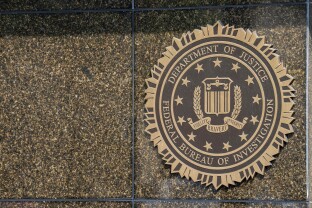A federal judge has placed a one-day administrative stay on the Department of Justice after government lawyers Thursday could not commit to keeping the names of FBI agents who worked on Jan. 6 insurrection cases confidential.
U.S. District Judge Jia M. Cobb made the decision after getting only a limited assurance from DOJ lawyers: that the department would not disclose that information outside the agency before a second court hearing on Friday.
It was a band-aid solution to address the judge’s apparent growing concern that the Trump administration could turn the law enforcement agency into a political football. Earlier in the day when Cobb asked whether the government could assert this list of names wouldn’t go public and acknowledge the risk in exposing them, prosecutors demurred.
“We need to consult with our superiors,” assistant U.S. attorney Jeremy Simon said Thursday morning.
But when the email finally came in from the top an hour later, it didn’t change much. DOJ lawyers, led by John C. Truong, a deputy chief of the DOJ’s civil division, could only agree that they had no “intention” or present plans to release the names — and would notify the federal judge if that changed.
What could have been a short court hearing on Thursday quickly became an all-day affair, one that underscored how the DOJ is in the middle of a seismic shift in priorities. The administration has ousted career executives at the department and the agency has turned its investigative power inward, considering reprisals against employees who engaged in routine work in the aftermath of the unprecedented Jan. 6, 2021 attack at the Capitol.
In conversations inside the courtroom and in the hallway, NOTUS witnessed opposing lawyers representing the FBI employees discuss that the DOJ’s lawyers weren’t giving assurances that agents’ names would remain private. The lawyers did not respond to a request for comment on their deliberations.
The DOJ is currently facing two lawsuits from FBI agents trying to stop the DOJ from exposing its own employees to the president’s political base.
Although prosecutors normally work hand-in-hand with FBI special agents and fiercely fight off attempts to identify them — even when handling public records requests — these DOJ lawyers were now arguing quite the opposite: ensuring that the judge wouldn’t impose any limit on what the federal government could do with information about its own investigators.
The government lawyers argued that “they have not identified anything imminent that is about to happen.”
FBI special agents this week filed two similar lawsuits to stop what they anticipate is political retaliation from President Donald Trump, raising serious concern that the administration could place a target on their backs now that Trump has issued sweeping pardons for Jan. 6 participants.
A federal judge must consider whether to impose restrictions on what the DOJ can do with the personnel information.
FBI employees were forced to fill out a survey questioning their roles in the nearly 2,400 investigations into those involved in the insurrection by 3 p.m. Monday, according to internal agency documents posted on the court docket. Results were turned over to the DOJ the next day at noon, lawyers said in court.
Acting FBI Director Brian Driscoll attempted to limit the potential for retribution against the agents by refusing to turn over their names — opting instead to only give DOJ employee ID numbers.
The question now is what the DOJ can do with that information. Lawyers representing agents, analysts and support staff argued in court on Thursday that those names could be handed over to Trump allies or Elon Musk and the DOGE commission.
Shortly before the court hearing, attorneys on both sides seemed to come to a tentative agreement that the list wouldn’t be weaponized. However, government lawyers wouldn’t make any promises in court, instead noting that the identities of FBI agents are routinely made public in court papers — and arguing that there are exceptions that could justify identifying them.
“There can be situations, if a name’s already public in a court proceeding or evidence of misconduct,” Simon said.
Pamela M. Keith, an attorney representing nine anonymous FBI employees, stressed that the survey agents were forced to take couldn’t possibly hint at wrongdoing. After all, the questions only asked to specify what role employees played in investigating and arresting rioters.
“Management made clear they want to ID anyone unprofessional or partisan but … you cannot derive from that whether a person was partisan,” she said in court.
The judge, for her part, seemed initially unconvinced that FBI agents could definitively prove that they were about to face political retaliation, saying, “a fear of something happening is not sufficient, even if the fear is a serious one,” she said.
But she changed her tone by the end of the day. At one point, they could not guarantee that the DOJ has not already leaked the list, with lawyers specifying that DOJ has not “officially” done so.
“There is no question that it would put a number of FBI agents and significant danger,” she said Thursday afternoon.
During that short break, Keith expressed concern that the DOJ can’t simply vow to keep the names of these agents from being released.
“That’s what stood out to me,” she said.
—
Jose Pagliery is a reporter at NOTUS.
Sign in
Log into your free account with your email. Don’t have one?
Check your email for a one-time code.
We sent a 4-digit code to . Enter the pin to confirm your account.
New code will be available in 1:00
Let’s try this again.
We encountered an error with the passcode sent to . Please reenter your email.


